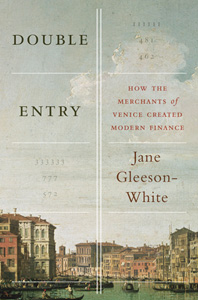“Double Entry”: A Tale of Two Books
 If you are looking to buy a holiday present for an accountant, then you should consider Double Entry: How the Merchants of Venice Created Modern Finance. It's a pretty fast read – both for its moderate length (256 pages) and for Jane Gleeson-White's graceful and clear writing style.
If you are looking to buy a holiday present for an accountant, then you should consider Double Entry: How the Merchants of Venice Created Modern Finance. It's a pretty fast read – both for its moderate length (256 pages) and for Jane Gleeson-White's graceful and clear writing style.
Double Entry also covers a lot of ground. It begins with what little is known about the origins of accounting in ancient Mesopotamia, moving quickly to the first known treatise on the eponymous bookkeeping* system published in 1494, and then to its proliferation throughout Europe (largely owing to the near simultaneous invention of the printing press).
That takes us almost exactly half-way through. I am certainly not an accounting historian, and for that reason I found these earlier chapters the most edifying. My friend and SUNY Geneseo professor Harry Howe summarized it nicely:
"It's a good read – suffering in a few places from a lack of technical precision (it's popular rather than scholarly history), but strong in explaining Pacioli's [the author of the accounting treatise] life and the breadth of his contributions. [Jane Gleeson-White] does indeed acknowledge the earlier origins of [double-entry bookkeeping], and does a nice job of explaining how arithmetic practiced within the convention of Roman numerals left no audit trail. We don't often think of the development of accounting as part of the Renaissance, but, after reading the first half of this book, it seems clear to me that we should."
The main theme of the remainder of the book is that while double entry bookkeeping has endured, the gap between what it measures and what should be measured has grown wider. Like this blog, it hews close to a wisdom of what gets measured gets done; and more important to Ms. Gleeson-White, that which doesn't get measured doesn't get done. But, even though Ms. Gleeson-White and I share a common interest in producing variations on that theme from stories of audit and accounting failures, she also sets her sites on accounting-abetted mismanagement of economies (value-neutral systems of national accounts) and the environment (failure to account for externalities).
Pardon the pun, but Double Entry feels like two books in one. The first 'book' is a celebration of a simple and deceptively powerful system for recording and summarizing economic events that has endured for perhaps a millennium. The second 'book' wants us to ask ourselves whether slavish devotion to that same system will prove to be the undoing of humanity.
Is appreciation of the ancient history of double entry bookkeeping helpful for answering the question posed by the second book? I don't think so, but if you love and are fascinated by accounting, then the whole of Double Entry is well worth reading.
———————-
*Here's a fun bit of trivia that not everybody knows (and is not in the book): "bookkeeping" and "bookkeeper" are the only words in the English language with three repeated letters in a row.
